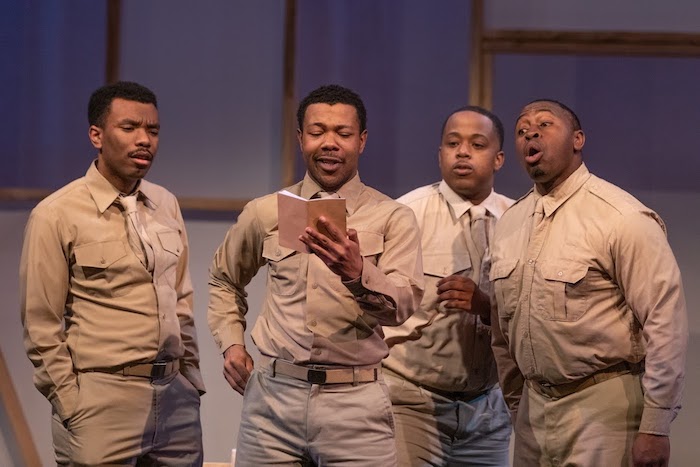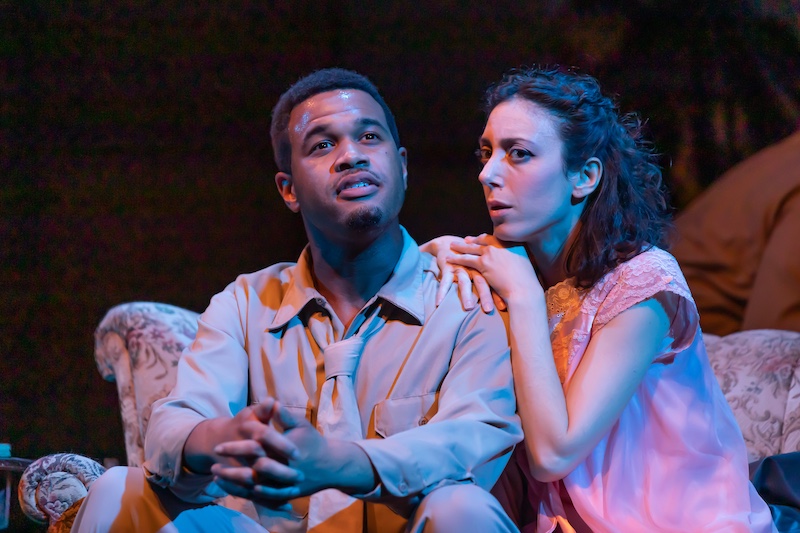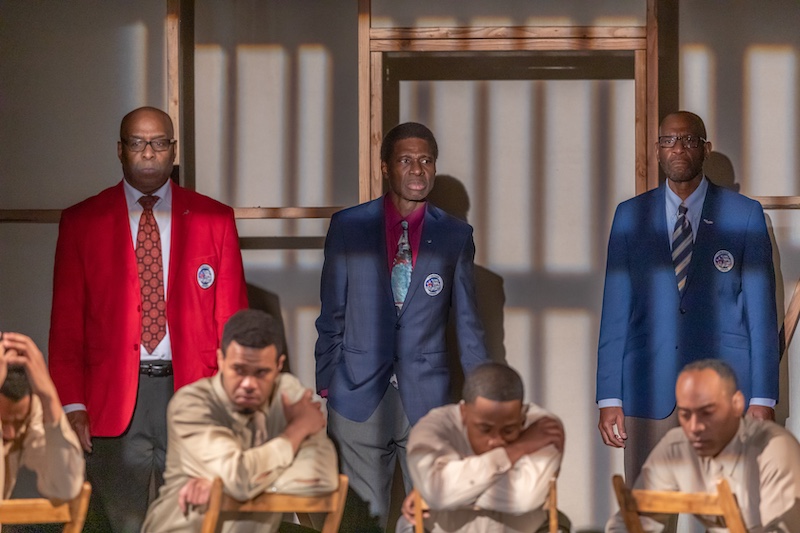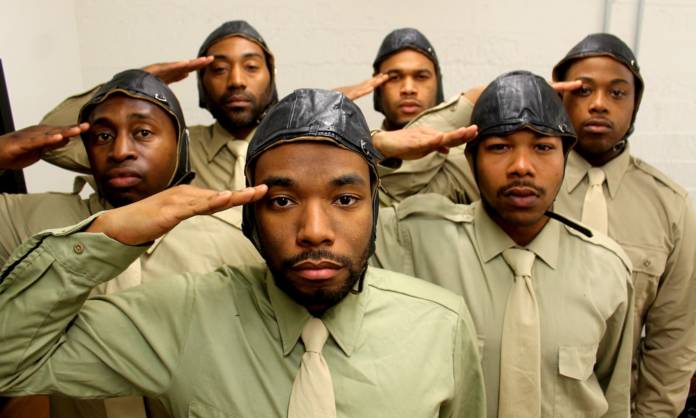ONSTAGE Black Eagles (through March 31 at Marines’ Memorial Theatre), now being staged by the African-American Shakespeare Company and directed by L. Peter Callender, illuminates a pivotal moment in US history.
The story of the Tuskegee Airmen, America’s first black combat pilots, is often obscured or marginalized in the thick annals of US involvement in World War II. Yet their accomplishments were astonishing: They flew 200 successful bombing escort missions and 15,000 combat sorties, destroying hundreds of Nazi aircraft and land vehicles and even sinking a destroyer.
“I have always wanted to do this play ever since I became Artistic Director of AASC,” Callender told the audience before the curtain went up. “With the recent passing of Willie Rogers [the last surviving member of the original Tuskegee Airmen who died at 101 in 2016), I felt in my bones it was time to bring their story to San Francisco and keep the memory of these great American heroes alive and strong.”
Callender had another reason for wanting to stage playwright Leslie Lee’s historic drama. He was in the original cast of the play at the Manhattan Theater Club in New York in 1991.
Lee effectively uses scenes in memory and in real time to present this important story from different perspectives. The play opens with a 1989 reunion of three of the veterans Leon (Thomas Robert Simpson), Clarkie (Gift Harris) and Nolan (Todd Risby) reminiscing about their war years at a Washington, DC ceremony commemorating their service and lauding the elevation of Colin Powell, the first African American Chief of Staff.

They recall the drama of fierce dog fights as well as the “white-knuckle” day First Lady Eleanor Roosevelt came to the base and flew with one of the pilots. “Swore that colored man was going to make Franklin Delano Roosevelt a widower,” says elder Leon.
When elder Nolan gives a long dramatic rendition of attacking an enemy plane, Leon exclaims, “It takes us half an hour longer each year to shoot the Jerrys down!” But, Nolan says, we did it “by the grace of God,” to which Leon responds, “That and being 22!”
It’s a perfect segue to 1944 when the men are 22, in a barracks in Italy raring to fly bombing missions. But the US military is segregated, and the Army Air Corps has relegated these experienced pilots to fly escort for white fighter pilots, with strict instructions not to go after any Germans, even in range. This frustrates the young men who are anxious to attack the fascist air force and to “get their kills.”
Help us save local journalism!
Every tax-deductible donation helps us grow to cover the issues that mean the most to our community. Become a 48 Hills Hero and support the only daily progressive news source in the Bay Area.
Most of the play takes place in those barracks, which the Eagles dub the “colored officers club,” in contrast to the off-limits white officers club. Set designer Kate Boyd uses cots, army blankets, and arching walls to evoke a simple Quonset hut; the plain wooden chairs double effectively as seats in the fighter jets when the airmen swoop and dive.
The camaraderie and pride among the airmen is palpable, especially during the Jitterbug Drill, an exuberant tap dance/march choreographed by Kendra Kimbrough Barnes.

Yet confined to segregated barracks and frustrated in their attempts to fly bombing missions, conflicts arise. Fights brew over discipline and the lack of it, charges of cowardice and grandstanding and breaking rules. Anger at the racism of the Army and the white officers, spills over into anger at each other, often for petty reasons. Lee’s nuanced dialogue and Callender’s tight direction brings you right into the close quarters of the barracks, and the full range of emotion at play, intensified by the immediate perils of wartime.
When young Nolan (Brandon Callender) breaks ranks to go after a German plane, he considers himself a hero. The others are dubious and criticize him for leaving a gaping hole in the formation. “Do you really think they are going to let any of us pickaninnies ride down Broadway in New York City after this war, with confetti floating down, bands playing, folks screaming and hollering, and white chicks blowing us kisses! It’ll be a cold-assed day in hell before they let that happen,” Leon (Devin A. Cunningham) says bitterly.
But as the battle over Italy heats up, the military reassigns the unit to fly bombing missions. As they celebrate their successes, they meet with another shock: The heroes who shot down 13 Germans are sent to the stockade, because they wouldn’t sign an oath swearing not to enter a whites-only facility.
Though the acting is sometimes uneven, the ensemble generally works well. Brandon Callender as young Nolan, is especially engaging: his energy and body language capture the character of a callow youth on a mission. He’s proud to be part of the Black Eagles, yet can’t resist breaking formation to get into the real fray.
The most convincing pair are those who play the poetic Leon, as a youth by Cunningham and his elder counterpart by Simpson, founder and artistic director of AfroSolo. They match each other’s sensibilities. There is a tender moment when the veterans seem to walk (unseen) through the barracks. The elder Clarkie admonishes the elder Leon to leave the young Leon alone to write his poetry, and the veteran replies, “I am that boy, he just doesn’t have my arthritis yet.”

One of the more listless scenes takes place off base, in the room of Pia (Margherita Ventura) the love interest of the romantic Buddy (Daniel Ray Antoine). The chemistry between the two pales in comparison to the strong, though sometimes volatile, ties of comradeship between the men.
Sound designer Everett Elton Bradman uses music creatively in the vigorous dance formation scene in the barracks, the transcendent voices of Lena Horne and Bessie Smith on the record player and the pilots’ melancholic rendition of Wild Blue Yonder after the group has been punished for being unwilling to go along with a racist regulation.
Playwright Lee, who died in 2014, wrote more than two dozen plays, most of which were performed at the Negro Ensemble Company in New York. Like August Wilson, his dramas portray the many facets of the African American experience in the United States through different decades. In “Ground People,” he wrote of black sharecroppers in the 1920s, “War Party” reveals conflicts in the civil rights organizations in the 1960s, and “Blues in a Broken Tongue” tells the story of a little known phenomenon—African-Americans who moved to the Soviet Union to escape racism in the US. His “Colored People’s Time” is a series of vignettes illustrating black life in America from the Civil War to the civil rights era.
The courage and principled stand of the Tuskegee Airmen eventually led to the desegregation of the US military—something they fought for in the air and on the ground. A standing ovation is due—and was given on opening night—to L. Peter Callender and the African American Shakespeare Company for amplifying their voices through Lee’s powerful Black Eagles.





